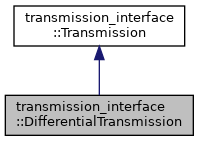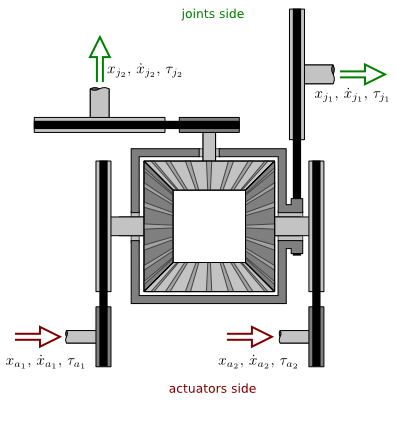Implementation of a differential transmission. More...
#include <differential_transmission.h>

Public Member Functions | |
| void | actuatorToJointAbsolutePosition (const ActuatorData &act_data, JointData &jnt_data) override |
| Transform absolute encoder values from actuator to joint space. More... | |
| void | actuatorToJointEffort (const ActuatorData &act_data, JointData &jnt_data) override |
| Transform effort variables from actuator to joint space. More... | |
| void | actuatorToJointPosition (const ActuatorData &act_data, JointData &jnt_data) override |
| Transform position variables from actuator to joint space. More... | |
| void | actuatorToJointTorqueSensor (const ActuatorData &act_data, JointData &jnt_data) override |
| Transform torque sensor values from actuator to joint space. More... | |
| void | actuatorToJointVelocity (const ActuatorData &act_data, JointData &jnt_data) override |
| Transform velocity variables from actuator to joint space. More... | |
| DifferentialTransmission (const std::vector< double > &actuator_reduction, const std::vector< double > &joint_reduction, const std::vector< double > &joint_offset) | |
| DifferentialTransmission (const std::vector< double > &actuator_reduction, const std::vector< double > &joint_reduction, bool ignore_transmission_for_absolute_encoders=false, const std::vector< double > &joint_offset=std::vector< double >(2, 0.0)) | |
| const std::vector< double > & | getActuatorReduction () const |
| const std::vector< double > & | getJointOffset () const |
| const std::vector< double > & | getJointReduction () const |
| bool | hasActuatorToJointAbsolutePosition () const override |
| bool | hasActuatorToJointTorqueSensor () const override |
| void | jointToActuatorEffort (const JointData &jnt_data, ActuatorData &act_data) override |
| Transform effort variables from joint to actuator space. More... | |
| void | jointToActuatorPosition (const JointData &jnt_data, ActuatorData &act_data) override |
| Transform position variables from joint to actuator space. More... | |
| void | jointToActuatorVelocity (const JointData &jnt_data, ActuatorData &act_data) override |
| Transform velocity variables from joint to actuator space. More... | |
| std::size_t | numActuators () const override |
| std::size_t | numJoints () const override |
 Public Member Functions inherited from transmission_interface::Transmission Public Member Functions inherited from transmission_interface::Transmission | |
| virtual | ~Transmission ()=default |
Protected Attributes | |
| std::vector< double > | act_reduction_ |
| bool | ignore_transmission_for_absolute_encoders_ |
| std::vector< double > | jnt_offset_ |
| std::vector< double > | jnt_reduction_ |
Detailed Description
Implementation of a differential transmission.
This transmission relates two actuators and two joints through a differential mechanism, as illustrated below.

| Actuator to joint |
|
|
|
| Joint to actuator |
|
|
|
where:
 ,
,  and
and  are position, velocity and effort variables, respectively.
are position, velocity and effort variables, respectively.- Subindices
 and
and  are used to represent actuator-space and joint-space variables, respectively.
are used to represent actuator-space and joint-space variables, respectively.  represents the offset between motor and joint zeros, expressed in joint position coordinates (cf. SimpleTransmission class documentation for a more detailed description of this variable).
represents the offset between motor and joint zeros, expressed in joint position coordinates (cf. SimpleTransmission class documentation for a more detailed description of this variable). represents a transmission ratio. Reducers/amplifiers are allowed on both the actuator and joint sides (depicted as timing belts in the figure). A transmission ratio can take any real value except zero. In particular:
represents a transmission ratio. Reducers/amplifiers are allowed on both the actuator and joint sides (depicted as timing belts in the figure). A transmission ratio can take any real value except zero. In particular:- If its absolute value is greater than one, it's a velocity reducer / effort amplifier, while if its absolute value lies in
 it's a velocity amplifier / effort reducer.
it's a velocity amplifier / effort reducer. - Negative values represent a direction flip, ie. input and output move in opposite directions.
- Important: Use transmission ratio signs to match this class' convention of positive actuator/joint directions with a given mechanical design, as they will in general not match.
- If its absolute value is greater than one, it's a velocity reducer / effort amplifier, while if its absolute value lies in
- Note
- This implementation currently assumes a specific layout for location of the actuators and joint axes which is common in robotic mechanisms. Please file an enhancement ticket if your use case does not adhere to this layout.
Definition at line 117 of file differential_transmission.h.
Constructor & Destructor Documentation
◆ DifferentialTransmission() [1/2]
|
inline |
- Parameters
-
actuator_reduction Reduction ratio of actuators. joint_reduction Reduction ratio of joints. joint_offset Joint position offset used in the position mappings.
- Precondition
- Nonzero actuator and joint reduction values.
Definition at line 238 of file differential_transmission.h.
◆ DifferentialTransmission() [2/2]
|
inline |
- Parameters
-
actuator_reduction Reduction ratio of actuators. joint_reduction Reduction ratio of joints. ignore_transmission_for_absolute_encoders Whether to take the data directly from absolute encoders instead of calculating through transmission. joint_offset Joint position offset used in the position mappings.
- Precondition
- Nonzero actuator and joint reduction values.
Definition at line 244 of file differential_transmission.h.
Member Function Documentation
◆ actuatorToJointAbsolutePosition()
|
inlineoverridevirtual |
Transform absolute encoder values from actuator to joint space.
- Parameters
-
[in] act_data Actuator-space variables. [out] jnt_data Joint-space variables.
- Precondition
- Actuator, joint position and absolute encoder position vectors must have the same size. To call this method it is not required that all other data vectors contain valid data, and can even remain empty.
Reimplemented from transmission_interface::Transmission.
Definition at line 308 of file differential_transmission.h.
◆ actuatorToJointEffort()
|
inlineoverridevirtual |
Transform effort variables from actuator to joint space.
- Parameters
-
[in] act_data Actuator-space variables. [out] jnt_data Joint-space variables.
- Precondition
- Actuator and joint effort vectors must have size 2 and point to valid data. To call this method it is not required that all other data vectors contain valid data, and can even remain empty.
Implements transmission_interface::Transmission.
Definition at line 269 of file differential_transmission.h.
◆ actuatorToJointPosition()
|
inlineoverridevirtual |
Transform position variables from actuator to joint space.
- Parameters
-
[in] act_data Actuator-space variables. [out] jnt_data Joint-space variables.
- Precondition
- Actuator and joint position vectors must have size 2 and point to valid data. To call this method it is not required that all other data vectors contain valid data, and can even remain empty.
Implements transmission_interface::Transmission.
Definition at line 295 of file differential_transmission.h.
◆ actuatorToJointTorqueSensor()
|
inlineoverridevirtual |
Transform torque sensor values from actuator to joint space.
- Parameters
-
[in] act_data Actuator-space variables. [out] jnt_data Joint-space variables.
- Precondition
- Actuator, joint position and torque sensor vectors must have the same size. To call this method it is not required that all other data vectors contain valid data, and can even remain empty.
Reimplemented from transmission_interface::Transmission.
Definition at line 329 of file differential_transmission.h.
◆ actuatorToJointVelocity()
|
inlineoverridevirtual |
Transform velocity variables from actuator to joint space.
- Parameters
-
[in] act_data Actuator-space variables. [out] jnt_data Joint-space variables.
- Precondition
- Actuator and joint velocity vectors must have size 2 and point to valid data. To call this method it is not required that all other data vectors contain valid data, and can even remain empty.
Implements transmission_interface::Transmission.
Definition at line 282 of file differential_transmission.h.
◆ getActuatorReduction()
|
inline |
Definition at line 227 of file differential_transmission.h.
◆ getJointOffset()
|
inline |
Definition at line 229 of file differential_transmission.h.
◆ getJointReduction()
|
inline |
Definition at line 228 of file differential_transmission.h.
◆ hasActuatorToJointAbsolutePosition()
|
inlineoverridevirtual |
Reimplemented from transmission_interface::Transmission.
Definition at line 224 of file differential_transmission.h.
◆ hasActuatorToJointTorqueSensor()
|
inlineoverridevirtual |
Reimplemented from transmission_interface::Transmission.
Definition at line 225 of file differential_transmission.h.
◆ jointToActuatorEffort()
|
inlineoverridevirtual |
Transform effort variables from joint to actuator space.
- Parameters
-
[in] jnt_data Joint-space variables. [out] act_data Actuator-space variables.
- Precondition
- Actuator and joint effort vectors must have size 2 and point to valid data. To call this method it is not required that all other data vectors contain valid data, and can even remain empty.
Implements transmission_interface::Transmission.
Definition at line 342 of file differential_transmission.h.
◆ jointToActuatorPosition()
|
inlineoverridevirtual |
Transform position variables from joint to actuator space.
- Parameters
-
[in] jnt_data Joint-space variables. [out] act_data Actuator-space variables.
- Precondition
- Actuator and joint position vectors must have size 2 and point to valid data. To call this method it is not required that all other data vectors contain valid data, and can even remain empty.
Implements transmission_interface::Transmission.
Definition at line 368 of file differential_transmission.h.
◆ jointToActuatorVelocity()
|
inlineoverridevirtual |
Transform velocity variables from joint to actuator space.
- Parameters
-
[in] jnt_data Joint-space variables. [out] act_data Actuator-space variables.
- Precondition
- Actuator and joint velocity vectors must have size 2 and point to valid data. To call this method it is not required that all other data vectors contain valid data, and can even remain empty.
Implements transmission_interface::Transmission.
Definition at line 355 of file differential_transmission.h.
◆ numActuators()
|
inlineoverridevirtual |
- Returns
- Number of actuators managed by transmission, ie. the dimension of the actuator space.
Implements transmission_interface::Transmission.
Definition at line 222 of file differential_transmission.h.
◆ numJoints()
|
inlineoverridevirtual |
- Returns
- Number of joints managed by transmission, ie. the dimension of the joint space.
Implements transmission_interface::Transmission.
Definition at line 223 of file differential_transmission.h.
Member Data Documentation
◆ act_reduction_
|
protected |
Definition at line 232 of file differential_transmission.h.
◆ ignore_transmission_for_absolute_encoders_
|
protected |
Definition at line 235 of file differential_transmission.h.
◆ jnt_offset_
|
protected |
Definition at line 234 of file differential_transmission.h.
◆ jnt_reduction_
|
protected |
Definition at line 233 of file differential_transmission.h.
The documentation for this class was generated from the following file:
![\begin{eqnarray*} \tau_{j_1} & = & n_{j_1} ( n_{a_1} \tau_{a_1} + n_{a_2} \tau_{a_2} ) \\[2.5em] \tau_{j_2} & = & n_{j_2} ( n_{a_1} \tau_{a_1} + n_{a_2} \tau_{a_2} ) \end{eqnarray*}](form_0.png)
![\begin{eqnarray*} \dot{x}_{j_1} & = & \frac{ \dot{x}_{a_1} / n_{a_1} + \dot{x}_{a_2} / n_{a_2} }{2 n_{j_1}} \\[1em] \dot{x}_{j_2} & = & \frac{ \dot{x}_{a_1} / n_{a_1} - \dot{x}_{a_2} / n_{a_2} }{2 n_{j_2}} \end{eqnarray*}](form_1.png)
![\begin{eqnarray*} x_{j_1} & = & \frac{ x_{a_1} / n_{a_1} + x_{a_2} / n_{a_2} }{2 n_{j_1}} + x_{off_1} \\[1em] x_{j_2} & = & \frac{ x_{a_1} / n_{a_1} - x_{a_2} / n_{a_2} }{2 n_{j_1}} + x_{off_2} \end{eqnarray*}](form_2.png)
![\begin{eqnarray*} \tau_{a_1} & = & \frac{ \tau_{j_1} / n_{j_1} + \tau_{j_2} / n_{j_2} }{2 n_{a_1}} \\[1em] \tau_{a_2} & = & \frac{ \tau_{j_1} / n_{j_1} - \tau_{j_2} / n_{j_2} }{2 n_{a_1}} \end{eqnarray*}](form_3.png)
![\begin{eqnarray*} \dot{x}_{a_1} & = & n_{a_1} ( n_{j_1} \dot{x}_{j_1} + n_{j_2} \dot{x}_{j_2} ) \\[2.5em] \dot{x}_{a_2} & = & n_{a_2} ( n_{j_1} \dot{x}_{j_1} - n_{j_2} \dot{x}_{j_2} ) \end{eqnarray*}](form_4.png)
![\begin{eqnarray*} x_{a_1} & = & n_{a_1} \left[ n_{j_1} (x_{j_1} - x_{off_1}) + n_{j_2} (x_{j_2} - x_{off_2}) \right] \\[2.5em] x_{a_2} & = & n_{a_2} \left[ n_{j_1} (x_{j_1} - x_{off_1}) - n_{j_2} (x_{j_2} - x_{off_2}) \right] \end{eqnarray*}](form_5.png)